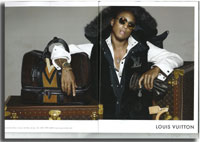
Like a lot of you, I grew up in a world where real stuff mattered. Things like real friendships, dedication, perseverance, truth, honesty and good clean fun. We marketers cleverly used these timeless values by attaching them to certain products and thereby creating emotional brand attributes and differentiators.
Today, in a world obsessed with celebrity and instant gratification, it is unimaginably harder to secure the long term success of a brand through careful navigation, versus taking quick tactical advantage of a fad or trend which might temporarily push up the sales graph but inadvertently sabotage your long-term chances.
So, in the October 2006 edition of British GQ, I chanced upon a Louis Vuitton advertisement. This brand plays in the luxury category - in which very fragile mythologies surround very expensive products with vast profit margins. In this category, people pay heaps of money for the halo effect that flaunting this stuff provides. Watches, cars, fashion, toiletries and alcohol dominate here.
The ad features a rapper-style model, very P.Diddy style covered in glitzy jewellery, tattoos and overt LV branding. This ad has me fascinated. My understanding of LV, and I have resisted research, is that it is a luggage brand created in the mid 1800s. It is obviously French, famous for its monogrammed trunks and bags. More recently Vuitton has extended its lines to include clothing and accessories. Until today, I saw no problem with the range evolution and extension. But something clearly has changed at Louis Vuitton.
Using an icon like Uma Thurman is no longer enough. In contemporising the brand, big-bling and flash-obsessed clients have entered the ads.
It's no longer about ageless travel, Bogard and Hepburn, The Queen Mary voyage, The Orient Express, the Champs De Eulyses. Right now I see Beijing, flash-bulbs, Puffy Coombs and Beyonce. Romantic Paris now has Hilton as a surname.
It would be interesting to know how the sales profile has changed at Vuitton, What is being bought by whom? Are most of Vuitton's sales come from the “wanna be” masses or those who have real class? This could pose the question of whether the brand itself needs to examine whether it is fake or authentic?
If it is people with real class, then the mistake could be big. My watch-out to those marketers that have these century old stories in their care is, understand what it is that creates something timeless and alluring, and resist the haunting ring of that till which may last just for the summer of 2007.
If the celebrity-struck masses have become the primary target, then perhaps Vuitton is for the first time being truly authentic, purposefully or not. This may be exactly what one would expect a fake authentic ad aimed at “wanna bes” in the 20th century to look like!
But when did it change that even a faddish and transient market buys brands like Louis Vuitton, Bentley and Louis Roederer - Crystal precisely for the pedigree, history and authenticity? These brands give the buyers their much sought-after class. The same reason that rappers and their groupies now down Crystal by the Jeraboam and drive Bentleys.
Or could what we truly aspire to have changed that much, in which case, yes, Vuitton must change course. You see, Sean Coombs may well be the new icon. He may indeed be the symbol of La Dolce Vita, the new Steve Mc Queen, James Bond or James Dean and for a new generation, his style may indeed become timeless. So therefore my question remains, is fake the new authentic? Or have I still got it the wrong way round?
German poet and philospher, Goethe, said “Things that matter most must never be at the mercy of things that matter least”. We'll see.
